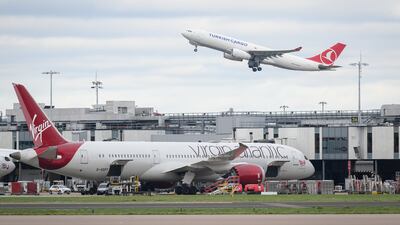The aviation industry is being held back by increasing costs and unhelpful taxation which is preventing growth, a major airline conference in London was told on Monday.
Air travel, be it people or cargo, is an important driver of economies across the world and should be recognised as such by policymakers and governments, who far too easily revert to the sector in order to raise tax revenue, the Airlines 2024 conference heard.
“There seems to be some kind of strange misconception about the profitability of the industry and the illusion of ticket prices and this seems to create some kind of impression of ‘we’ve got to rein in these airlines so that they don’t make so much profit’, but clearly that’s absolutely wrong,” the chief economist at IATA, Marie Owens Thomsen, said.

Working with Oxford Economics, the industry body Air Transport Action Group (Atag) found that in 2019, the aviation industry contributed $3.5 trillion to the world economy, accounted for 4.1 per cent of global GDP and moved 35 per cent of worldwide trade. In addition, the report calculated that if the aviation industry was a country, it would be the 17th-largest economy in the world. The year 2019 was used as a benchmark, because it represents pre-Covid stable conditions.
"Aviation's continued success depends on its economic viability," said Juan Carlos Salazar, secretary general of the International Civil Aviation Organisation (ICAO). To that end, much of the talk among delegates at the Airlines 2024 conference centred upon the taxes levied on airlines and especially in the case of the UK, the air passenger duty (APD).
Shai Weiss, chief executive of Virgin Atlantic, says successive UK governments have preferred to view the airline industry as an easy opportunity to raise tax revenue, rather than an essential engine of economic growth. “I don’t think in this country the government, either Labour or Conservative, have done a good job of identifying aviation as strategic national asset," he said.
"This is an island nation – it’s obvious that we need a thriving aviation industry to promote growth and foreign direct investment. All we’ve seen is increasing APD, and by 2030 this industry will pay £6.5 billion of tax.”
Ms Owens Thomsen agreed and said that simultaneously taxing and promising to support aviation as an economic asset amounted to confusing and mixed signals from governments, because when an industry incurs added taxation "you’re saying that you want this activity to stop or decrease.
“Currently, the UK is deliberately through its tax policy saying to the universe they want this industry to not do so well," she told the conference. "If we believe that we really need to grow to be able to solve our problems, and if we believe that aviation is a necessary ingredient in terms of producing that growth, then you get a very incoherent economic policy if you try to stop that activity.”
'Canary in coal mine'
The taxation issue, the conference heard, was born out of a skewed perception that because airfares have increased in the past few years, airlines must be making bumper profits. The industry leaders argued that this is not the case and that margins are still at around 3 per cent on average.
Ms Owens Thomsen said the price of jet fuel has changed. So, while airfares have not kept up with consumer price inflation, they are actually way below jet fuel price inflation, and "that’s the one that matters to our profitability because it’s 30 per cent of the industry’s cost base,” she added.
Mr Weiss said the industry has also had to contend with delays to aircraft deliveries, which has reduce the number of available planes on certain routes. The woes at Boeing are well-known, but Mr Weiss also pointed to problems with Rolls-Royce's Trent 1,000 engines on some of the aircraft in the Virgin Atlantic fleet. He added that while that is hampering capacity, it shouldn't affect ticket prices in the near future.

While Mr Weiss called for the UK government to recognise airlines as assets and not cash cows to be milked for tax revenue, Michael Stark, deputy director for commercial strategy and sponsorship at the UK's department of transport, told the Airlines 2024 conference that the consumer needed to be placed at the centre of policy-making. "We hear a lot the sentiment that aviation, as an island nation, is essential for our connectivity. I don't think that point is lost on us at all, I think it's well and truly understood."
Ronce Almond, managing director of international affairs for American Airlines, pointed out that the aviation industry is so intertwined with the global economy, it acts like a "canary in a coal mine" and is a "strategic asset". But Ms Owens Thomsen perhaps summed up the mood best with one simple sentence: "To produce growth, we clearly must fly.”


